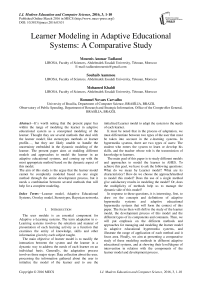Learner Modeling in Adaptive Educational Systems: A Comparative Study
Автор: Mouenis Anouar Tadlaoui, Souhaib Aammou, Mohamed Khaldi, Rommel Novaes Carvalho
Журнал: International Journal of Modern Education and Computer Science (IJMECS) @ijmecs
Статья в выпуске: 3 vol.8, 2016 года.
Бесплатный доступ
It's worth noting that the present paper lies within the range of modeling the learner in adaptive educational system as a conceptual modeling of the learner. Thought they are several methods that deal with the learner model; like stereotypes methods or learner profile…, but they are likely unable to handle the uncertainty embedded in the dynamic modeling of the learner. The present paper aims at studding different models and approaches to model the learner in an adaptive educational systems, and coming up with the most appropriate method based on the dynamic aspect of this model. The aim of this study is the argue that the learner model cannot be completely modeled based on one single method through the entire development process, but it needs a combination between several methods that will help for a complete modeling.
Learner model, Adaptive Educational Systems, Overlay model, Stereotypes, Bayesian networks
Короткий адрес: https://sciup.org/15014843
IDR: 15014843
Текст научной статьи Learner Modeling in Adaptive Educational Systems: A Comparative Study
Published Online March 2016 in MECS DOI: 10.5815/ijmecs.2016.03.01
The user module is an essential component for Adaptive e-Learning systems. The term adaptation in eLearning systems involves the selection and manner of presentation of each learning activity as a function that examines the entity of knowledge, skills and other information given by each subject taught.
The main objective of learner model is to modify the interaction between the system and the learner in a dynamic way to address the needs of each learner on an individual basis. Generally, the adaptation process involves three major steps: Data collection about the user, processing the information gathered about the user to initialize the model of the learner and to use the initialized Learner model to adapt the system to the needs of each learner.
It must be noted that in the process of adaptation, we must differentiate between two types of the user that must be taken into account in the e-learning systems. In hypermedia systems, there are two types of users: The student who enters the system to learn or develop his skills, and the teacher whose role is the transmission of knowledge to learners.
The main goal of this paper is to study different models and approaches to model the learner in AHES. To achieve this goal, we have to ask the following questions: What do we mean by Learner model? What are its characteristics? How do we choose the approach/method to model this model? Does the use of a single method give satisfactory results in modeling the model? Or, does the multiplicity of methods help us to manage the dynamic side of this model?
In response to these questions, it is interesting, first, to draw on the concepts and definitions of adaptive hypermedia systems and adaptive educational hypermedia systems that will form the context of this paper. The focus then will shift to the study of the learner model, the development process of this model and the different types of its components and cotenants. Then, we will put emphasis on the different methods and approaches for managing and modeling the learner model in adaptive educational hypermedia systems, and illustrate the range of application of each method and it focus area. Finally, we aim at presenting a comparative study of these modeling methods in different adaptive educational systems, and at showing their level/degree of intervention in relation with the components of the learner model and development process.
-
II. User model in E-learning adaptative
In this section, we will start by describing the architecture of the adaptive educational systems. And then, we will focus on the role of the user in these adaptive systems and adaptive educational systems.
-
A. Adaptive Educational Systems’ Architecture
In general, the architecture of educational adaptive systems (AEHS) comprises two layers: the storage and implementation layer.
The storage layer is the main engine that controls adaptive process whose main tasks are:
-
- Initialization and update of the learner model
-
- The choice of the domain model concepts,
learning resources by applying specific rules.
-
- Storing the learning resources, domain ontologies, the model of the learner, etc.
The execution Layer is responsible for the presentation of the adaptive learning material to the user and the observation of the user’s actions so as to update the learner model.
"Fig.1" represents the architecture of AEHS [1]; the storage layer in this architecture has four models:
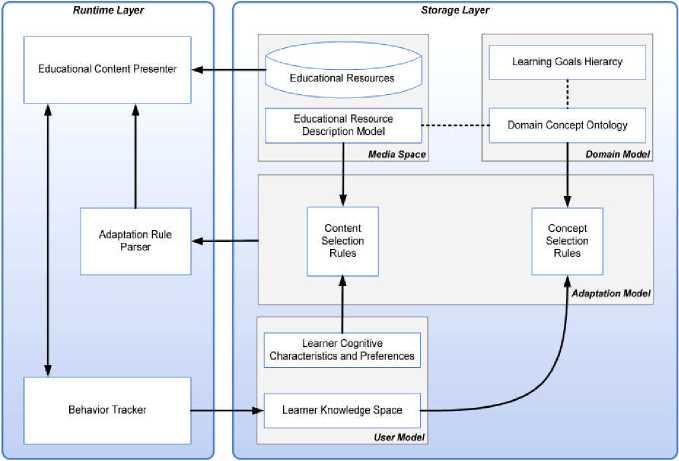
Fig.1. AEHS Architecture [Henze, Nejdl 2004].
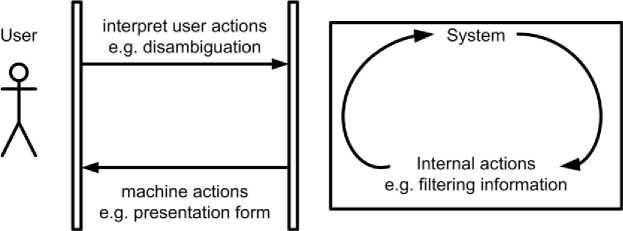
Fig.2. Role of the User Model in Adaptation Presented [Kay 2000]
-
- Domain model structure of knowledge domain which is often referred to as a graph. Several researchers intend to build the domain model by using ontologies.
-
- Media Model contains learning resources and associated descriptive information (metadata).
-
- Adaptation model is the main component that gives effect to adaptation. It contains content and concepts selection rules. By applying these rules in content selection, it helps us choose the appropriate educational resources from the internal model. On the other hand, the concept selection
rules are used to select the appropriate notions of the domain model. These rules must comply with a user model so that the selection becomes correct.
-
- User Model contains information and data about the user.
-
B. The role of the user model in adaptive systems
According to Kay [2], the user model can assist in the adaptation of the system in three major ways. "Fig.2" indicates different uses of the user model during the interaction between the user and the system.
The first usage of the user model is represented by the user's arrow towards the system; the fact which reflects the possible actions of the user with the interface such as writing through the keyboard, selection by using the mouse and audio / video inputs. In this phase of interaction the role of the user model is to interpret the information in the system. The above figure illustrate the way the user model supports or allow the system to clarify the user input when it is put in an ambiguous form by identifing the applications in areas such as natural language understanding, interepting command line and misspellings by dyslexic users or typing problems by users with mobility problems.
The second type of interaction is represented by the arrow from the system toward the user. In this phase The user model is used to modify and control the system and adjust the shares according to the preferences of the user. This method is used to adapt the system according to the user’s actions by adapting the content and its representation. For example, e-Learning systems can adapt their activities according to the knowledge’s field of the user based on learners information, and assign learning activities according to the level of each learner in a specific field. Adaptive hypermedia systems focus on adapting the navigation and content preferences according to the domain knowledge stored in the user model.
The third usage of the user model is concerns with the internal system actions. The user model assist the system to filter the information received before saving.
The combination of these three types of action is used in adaptive systems. concidering an e-learning system that helps learners solve problems, the system first takes use of the user module to interpret the action of the user. Thus, the system performs a set of interiors actions that are interrelated to the user model, to select the most suitable learning situation for the learner’s request. After these interiors actions, the system generates actions in the interface.
According to Koch [3], there are seven key features of the user model. These features are user-centric:
-
- Assist the user during the learning of a specific subject.
-
- Provides information to adjust the user.
-
- Adapt the interface to the user.
-
- Help users to find information.
-
- Give immediate feedback to the user on his level of knowledge.
-
- Support collaborative work.
-
- Assist the user during use of the system.
-
C. The user model in AEHS
Before presenting the model users in adaptive educational hypermedia systems, we must first graspe the position of adaptation in educational hypermedia systems. According to Brusilovsky [4], the adaptation of hypermedia can be applied mainly in the presentation and navigation between hyperspaces. "Fig.3" represents the breakdown of adaptation in several technologies used in adaptive hypermedia.
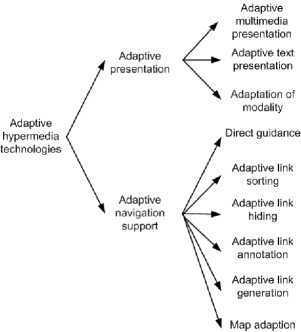
Fig.3. Adaptation’s Levels in Hypermedia Technologies
To adapt the presentation of the learning content and navigation with the needs of the user, the adaptive system needs a user model that includes goals or task, history and preferences to accumulate response to how and why adaptation. Other learner models [5] also include interest and personal traits such as personality factors, cognitive factors and learning styles; that contains constant characteristics on the user even if his interests changes over time.
-
III. Learner model’S caractristiques
In this section, we will start by d by differentiating between the concepts of learner profile and the learner model. Then, we will present the cotenants and corposants of the learner model which we aim to model later.
-
A. The learner profile, and the learner model
Before defining user model, learner model and learner profile. It is interesting first to illustrate the difference between "learner profile" and "learner model."
The learner profile is a collection of personal information about the learner. This information is recorded without any description or interpretation. Learner profiles represents the essential information of the learner, such as cognitive skills, skills, intentions, learning styles, preferences and interaction of the learner with the system. The modeling of this stored information gives us the model of the learner.
"Fig.4" represents the process of adaptation performed by the learner model in an adaptive system. The learner information can be modeled on the basis of the content and the amount of information about the user which is stored in the user profile that change within time. Thus, the user profile is used to retrieve the necessary information to formulate a learner model. Koch describes a model of the user that the representation of the beliefs of the system on the user. The user of the "real world" is perceived by the system through the human-machine interface.
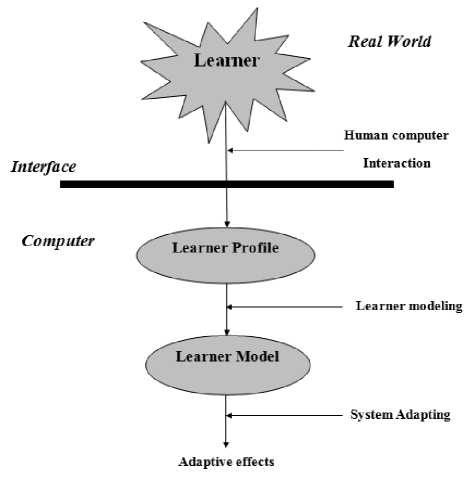
Fig.4. Learner’s Profile and Learner Model in Adaptation
A profile contains personal information without deduction or interpretation. Unlike the learner model which is a higher level than the learner profile, learner profile is seen as an abstract view of the learner. Moreover, the learner model is able to deduct additional information about the learner. The learner model is based upon such information and is therefore only a small part of the actual learning. Nevertheless, the learner model must represent the necessary characteristics of the learner in the context of the education system.
-
B. The components of a learner model
The components of a learner model are stored information that can be analyzed and grouped according to different levels of information. These components are connected to the application of the learner model. There are two types of components in the model of the learner:
-
- The performance model stores data sets related to assessments of learner skills. [6]
-
- The model of learning history follows types of data presented to the learner during use of the system, and measures system knowledge level based on the history of the interaction with the interface [7].
According to Zhou [6], it is necessary to put additional components to provide complete information about the learner. Such as: response history and balance the sheet of solutions. The learner’s response history is attached to each unit of instruction; it stores information about the learning items and the learner responses during a learning situation. The number of errors and descriptions of these errors during the problem solving process are stored in the solution or the balance sheet.
According to Castillo [8], he proposes that the learner model must be divided into several components such as profile, model of cognitive overlay and an overlay model.
-
C. The contents of a learner model
According Self [9], a complete learner model must contain information about the domain knowledge of the learner, his preferences, key goals, interests, his progress and other information about the learner. All this information is essential for the use of the systems.
Brusilovsky [4] states that learners models can be classified according to the nature and form of the information contained in the models. Taking the example of a subject area, the information stored in the learner model is composed of two areas of information: the specific domain of information and independent domain of information. "Fig.5" shows the components of each information domain, the combination of these two areas of information provides a complete view of learners for adaptive systems.
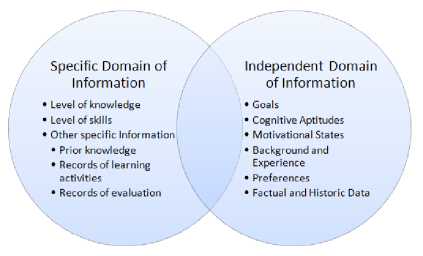
Fig.5. Learner Domaines of Informations
-
1) Specific domain of information
The specific domain of information is a reflection of the level of knowledge and skills of a student in a learning situation.
Brusilovsky [4] names of the specific domain of information to the model of a specific area. The knowledge model can be based on the combination of two or more initialization method and models such as: scalar model, the overlay model, error model, genetic model ... in this paper, we will not argue the initialization methods of the domain model, but we will discuss in the following sections some aspect of this methods to explain what we mean by the initialization of a learner model.
Furthermore, the specific domain of information stores other additional information, which is related to the learner in a specific area, in the learner model. Theses information can be stored as follows:
-
- The requirements in the area of learning to the learner.
-
- An archive of information on learning activities.
-
- a n archive on the assessments and tests .
-
2) Independent domain of information
In addition to storing the level of current knowledge of a learner, independent domain of information facilitates the process of adaptability. According to Han [10], the independent area information on a learner includes:
-
- Goals: it is important to know the goals of the learner and to determine the learning strategies. The goal can be divided into two different types: The first type is the learning goal which is relatively stable for a training unit. The second type is the problem-solving goal which can shift from one problem to another within the same learning situation.
-
- Cognitive aptitudes: cognitive aptitudes are the intellectual capacity for different kinds of cognitive performance. Such as, musical ability, mathematical ability ...
-
- Motivation States : Measures the learner’s
motivational state in training, teaching… Motivation is measured using a number of longterm and short-term parameters. These parameters are for example the effort, attention, interest, distraction and persistence, etc. These parameters are related to other factors such as the level of knowledge, preparation, the complexity of the subject and the learning outcomes.
-
- Background and Experience: the background and experience of a learner are derived from the model parameters, information about the background and experience are used. General information includes skills that can influence the achievement of learning. Such information displays the occupation, work experience or perspectives of a learner
-
- Preferences: Learners may have different
preferences related to aspects of the learning environment. These preferences are considered non-inducible system. Thus, the student must inform the system directly or indirectly of his or her preferences
-
IV. Learner Modelling: Techniques and Methods
A learner model is a combination of all relevant data on the learner in relation to a learning environment. There are common types of information among learners’ models such as object domain information, goals, motivation, training and experience, cognitive skills, preferences and demographic training data.
The contents of a learner model are arranged in multiple components depending on the type of information. To put together the necessary information, it is necessary to make use of different methods that will be presented in this section, and will be investigated to show the impact of each one of them on adaptive systems and its field of intervention.
-
A. Overlay model
The main idea of overlay model is that the learner model is a domain model subset. In other words, the learner overlay model is a shot of the full domain model. "Fig.6" represents the relationships between the different concepts of a domain model.
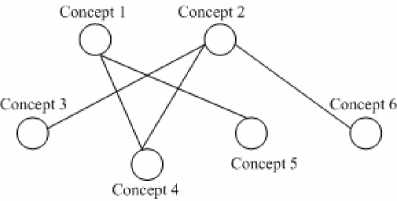
Fig.6. Example of the Overlay Model Concept
A domain model consists of a set of knowledge elements representing the knowledge of expertise; each element represents a concept, a topic or a theme in a major field. Thus, the model structure of the learner "mimics" the domain model structure. However, each model element of the learner (corresponding to each domain model element) has a specific value measuring the knowledge of the user of this element. This value is considered the master of the domain element included a certain range. In other words, the domain is decomposed into a set of elements and the overlay model (learner model) which is a set of the more mastered elements. Suppose that mastery level of each element ranges from 0 (not mastered) to 1 (mastered). The expert model is the superposition with 1 for each element and the learner model is the superposition 1 at most for each item.
The overlay modeling approach was based on the domain models which are often constructed as a knowledge network or hierarchical tree of knowledge. Experts are the authors with the responsibility to create the domain model. Normally, each concept in the domain model is mapped to a learning object. Today there is a tendency to build the domain model using ontologies.
-
B. Stereotype method
Generally, stereotypes represent a class or group of learners. There are two types of stereotypes: fixed and default.
In fixed stereotypes, the learner is assigned to a predefined stereotype on an abstract level. For example: in a data base module, learners are divided into four groups corresponding to four levels (novice, beginner, advanced and expert). "Fig.7" illustrate that each level is more difficult than the previous level: After getting individual information such as: knowledge, experience, skills ... the system assigns each student one of four levels, and it will never change in this type of stereotype.
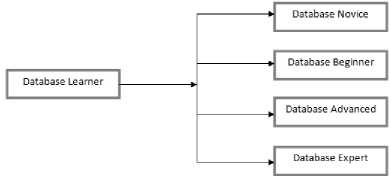
Fig.7. Example of the Stereotype Method Concept
In default stereotype, the system is more flexible. Therefore, the learner is assigned first to the initial stereotype. This means that the initial stereotype has a value "default". During the learning process the system will observe their learners and collect performance data, their actions, their test results ... Then, the system will modify the original stereotype again to a more appropriate stereotype, whereby the default stereotype setting is gradually replaced by a more accurate stereotype for the learner.
There are three important elements in every stereotype: triggers, inference and retraction:
-
- Trigger is used to activate a stereotype. In other words, it is a condition to assign a stereotype to the learner. For example: if the trigger "I have no knowledge of the database" is activated, the stereotype "Database-novice" will be assigned to the learner.
-
- Inference is an engine which is responsible for the
deduction of information related to the learner. For illustration: if the learner is connected to stereotype "Database-expert" the inference engine should take both essential information and additional information such as, learner knows the design of databases, relational models SQL queries and ...
-
- Retraction: provides the conditions to disable the stereotype of the learner. In the case of retraction, the learner is assigned with the stereotype "Database-novice" at the auto set of the course; but the learner then enriches the knowledge in database after the learning process, the fact that will make of the stereotype "Database- novice "an unsuitable stereotype. The event "the learner has passed the Database test with success" is the condition to retrace its stereotype "Databasenovice" and it will be replaced with the stereotype "Database-Expert".
-
C. Machine learning
For Webb [11], machine learning methods are used to model the cognitive processes underlying the actions of the learner like modeling differences between the learner's skills and the expert’s skills, modeling behavioral preferences of the learner and his characteristics. Yet, it must be noticed that the two first objectives of this method are very often addressed, but modeling the behavior and characteristics of the leaner is rarely used by specialized scholars.
-
D. Plan recognition
Plan recognition is a sequence of actions of learners to achieve concrete goals. The plan recognition is based on the monitory of the performance of the user based on these entries [12].
User actions are adapted to a library of all possible plans. The plan most similar to the actions of the user actions will be chosen as a model of the learner. It is a plan recognition process. In this approach, it is very expensive to create a library and requires complex calculation and a large storage. And the implementation of this method requires a complex algorithm.
-
E. Deferential model
The overlay model is based on domain knowledge of the expert, but it is necessary for the learner / teacher to transit the knowledge to the learner. This knowledge is called the expected knowledge. In other words, experts’ knowledge is the domain knowledge that learners must master for some time.
Therefore, the differential model is essentially an overlay model on the knowledge provided, which in turn, is superimposed on the domain of expert knowledge. With the list of the top-down methodology, differential model is a variant of the overlay model.
However, the differential model is an instance of the class "default model", because knowledge should be considered as the knowledge that the user does not have.
-
F. Perturbation model
Both overlay model and differential model assume that the learner's knowledge is the subset of the misconceptions of expertise knowledge or lack of knowledge. These errors were considered false beliefs.
"Fig.8" represents the hierarchy of the perturbation model in which the learner’s knowledge is represented as a subset of expert’s knowledge (as an overlay model) to add their false knowledge. Thus, the perturbation model is also an instance of the "fault pattern" class. This model, therefore, opens a new trend of modeling that can be supportive and suitable for adaptive system.
Incorrect knowledge
Correct knowledge
Learner knowledge
-
Fig.8. Learner Knowledge in the Perturbation Model
-
G. Bayesian methods
-
1) Definition
Knowledge representation and reasoning from these representations has created many models. Probabilistic graphical models, specifically Bayesian networks initiated by Pearl [13] in the 1980s, have proved to be useful tools for the representation of uncertain knowledge and reasoning from incomplete information.
A Bayesian network B = (G, N) is defined by
G = (X, E) , acyclic directed graph with vertices associated with a set of random variablesX = (X, ... ,Xn); N = {P(Xi | Pa(Xi))}
All the probabilities of each node Xi conditionally to the state of its parents Pa(Xi) in G.
Thus, the graphical part of the Bayesian network indicates the dependency (or independence) between variables and provides a visual tool for knowledge representation that is easily comprehended by its users. In addition, the use of probability allows us to take into account the uncertainty in quantifying the dependencies between variables. Both properties have been the reason behind the first names of Bayesian networks, "probabilistic expert systems", where the graph is compared to the set of rules of conventional expert system, where the conditional probabilities presented as a quantification uncertainty about the rules.
Mayo [14] has also shown that Bayesian networks allow representing compactly the joint probability distribution over the set of variables, described in formula (1):
P(X1, X2,· · · ,Xn) =∏i=l P(Xi | Pa(Xi)) (1)
This decomposition of a global function, as a local product terms depending only of the node and its parents in the graph, is a fundamental property of Bayesian networks. It is the basis of the first work on the development of inference algorithms which calculate the probability of any variable of the model from the same partial observation of other variables. This has been proved NP-complete, but resulted in different algorithms that can be treated as information propagation methods in a graph. These methods obviously use the concept of conditional probability, i.e. what is the probability of Xi knowing that I have observed Xj , but also the Bayes theorem that calculates, conversely, the probability of Xj knowing Xi, when P(Xi | Xj) is known.
-
2) Construction of a Bayesian network
As we have seen in the definition, the complete specification of a Bayesian network requires specifying a share structure (directed acyclic graph that underlies) and other parameters (probability tables). To do this, two approaches are possible and can be combined: the collection of expertise and machine learning, which is one of the contributions of Bayesian networks.
In the case of collection of expertise, the definition of the network structure begins with the identification of possible nodes and the distinction between (unobservable) informational variables (inputs) or hypothetical. The existence of an arc can be analyzed in terms of influence of one variable on another, but its orientation is more difficult. Traditionally, an arc is directed from A to B if A is a cause of B, but we will see that this interpretation is not so simple as in the case of the learner modeling. The parameters are in turn attached in an approximate manner by using frequentists or qualitative information.
Since Bayesian network is a probability distribution, we can use maximum likelihood as statistical learning parameters criterion. The result is as a Bayesian network whose structure is fixed and E which is a comprehensive basis of example, the maximum likelihood is achieved if the parameters of the Bayesian network are equal to the frequencies of the same features observed in E. statistical learning structure requires for its development test to determine whether or not the random variables are conditionally independent.
-
3) Using Bayesian networks for learner modeling
In general, Bayesian methods are related to other modeling methods of the learner model like the overlay model, methods of stereotypes or the machine learning methods. Bayesian methods use probabilistic inference to update and improve the belief values of a learner during a learning situation. The main objective of Bayesian networks is the probabilistic inference. Bayesian network models explicitly the uncertainty between the requirements represented by use case and collaboration diagrams elements that’s represents the user actions in an adaptive system.
We believe that Bayesian networks will provide a solution that will allow us to understand and measure dynamically all the actions of the learner in a learning situation. The networks obtained will provide us with a capacity to monitor and evaluate the performance of every learner at a real time, the learner’s actions, the reason for these choices, and identification of each of the paths that will be followed during a learning situation.
-
V. Learner Modelling Methodes: Comparative
Study
Based on the conducted research on modeling the learner model in adaptive educational hypermedia, this section will try to present a comparative analysis of all the methods of learner modeling and management, and to work out an appropriate method that will gives us satisfying results.
-
A. Learner modeling in the existing AHES
In order to present a comprehensive comparative study on learner modeling in adaptive educational systems. It seems necessary compare the modeling of the learner model in ten different adaptive educational hypermedia systems.
"Table 1" represents 10 different adaptive educational hypermedia systems. Reflecting for each AHES the methods or approaches used to model the learner model.
AVANTI is a system designed for a range of users with different needs. This system combines in the stages of data collection and initialization of the learner model stereotypes and superposition method to create initial assumptions, and to maintain the knowledge of the user.
The AHM system, in which the adaptation depends on the level of expertise on the concepts of the field know the system is a subset of all the user's domain concepts.
The ELM-ART system is an Adaptive distance Tutor system, which support learning Lisp programming language. It uses different techniques for initializing and updating its learning model: overlay model, the complex machine learning methods and Bayesian networks to represent episodic learning model
Table 1. Learner Modeling Methods in AHES
|
AHES |
Learner model modeling techniques/ methods |
|||||
|
Stereotypes |
Overlay Model |
Perturbation model |
Differential model |
Machine Learning |
Bayesian Networks |
|
|
AHA |
- |
X |
- |
X |
- |
- |
|
ADAPTWEB |
- |
- |
- |
- |
X |
- |
|
AVANTI |
X |
X |
- |
- |
- |
- |
|
ANATOMTUTOR |
X |
- |
- |
- |
- |
- |
|
AHM |
- |
X |
X |
- |
- |
X |
|
INSPIRE |
X |
- |
- |
- |
X |
|
|
HYPADAPTER |
- |
X |
- |
- |
- |
X |
|
ELM-ART |
- |
X |
- |
- |
X |
X |
|
HYNECOS |
X |
- |
- |
- |
- |
- |
|
METADOC |
X |
- |
- |
- |
- |
- |
Table 2. Comparative Table between Learner Modeling Methods.
|
Learner modeling methods |
Learner modeling |
Learner model cotenants |
|||
|
Data collection |
Learner model initialization |
Learner model update |
Domain specific information |
Domain Independent information |
|
|
Machine Learning |
- |
X |
- |
X |
- |
|
Overlay model |
- |
X |
X |
X |
- |
|
Differential model |
- |
X |
X |
X |
- |
|
Stereotypes |
X |
X |
- |
X |
|
|
Plan recognition |
- |
X |
X |
- |
X |
|
Perturbation model |
- |
X |
X |
X |
- |
|
Bayesian networks |
X |
X |
X |
X |
X |
-
B. The modeling methods’ area of intervention
"Table 2" represents a comparison between the different methods of learner modeling in adaptive system from previous research like [3], [4] and [10].
The machine learning method operates in the initialization and the update steps of the learner model, which enables the ability to manage accurately and dynamically the cotenants of a specific area of the information from a learner model. By using this method, we can represent the learner’s knowledge and skills and trace its evolution in a learning situation. However, there is a representation deficiency of independent information in the field of information in the learner model and in the data collection phase of a learner model.
The overlay model, the differential model and perturbation model are concerned with the representation of the specific domain of information of the knowledge domain as it is emphasized in previous sections. The representation of other aspects of the learner such as preferences, history, and learning styles ... requires a combination of these methods with other methods that are concerned to manage the actions and preferences of the learner.
The method of stereotypes is the most useful method used during the stages of data collection and initialization of the learner in adaptive systems. But the update of the learner model requires the combination of this method with other more flexible methods such as machine learning or Bayesian networks. The stereotypes method does not give the system the ability to track and adapt dynamically to each share of the learner, it is limited to affect the learner to a well-defined stereotype after termination of the situation of learning.
Bayesian networks appear to be formalism that enables us to ensure the inclusion of uncertainty in modeling the learner, such as implementations of different systems have shown. However the level of learner expertise should not be translated only by changes of probability but also by structural changes.
-
C. Learner model development
Despite these various attempts to model the learning that is characterized by a dynamic aspect, we always find it difficult to achieve this goal. The proposed approaches give us just a static view of the learner model, but in practice this model is in full development (the learner knowledge is evolving in the same module) to a dynamic view. In order to monitor the behavior of the learner in real time during training, we must adopt a model for dynamic management of the learning model.
All actions of the learner in a learning situation are not limited to valid or invalid actions (true and false), but these actions are characterized according to the learner learning path during his training. From this observation, we cannot represent the information from the system of each learner as a relative data. This demands putting our work in a probabilistic context due to the changes in the learner model during training.
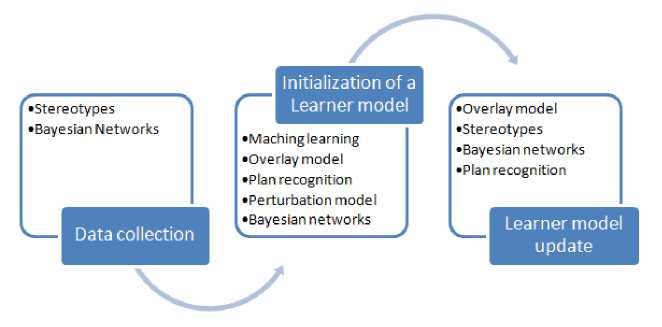
Fig.9. Learner Model’s Construction Methods
"Fig.9" represents the stages of development of a model of the learner, and the intervention of each management method learner model. In the data collection phase, we find the method of stereotypes and Bayesian networks are the most used. The first method focus on the learner’s responses to the personal information stored for the formulation of the learner profile, where as for the Bayesian networks method represent the learner’s information as a direct acyclic graph and constructs one or more network that contain this information.
In the initialization stage of a learner model, the collected data undertakes a transformation process towards the model of the learner. This initialization process is realized through the implementation of several methods. The overlay model is the most useful method that initializes then information of the domain of this model, but it neglects independent domain information. The same remark can be made about the perturbation and differential method. On the other hand, the plan recognition method sets up independent domain of information based on monitoring the performance of the user in adaptive systems. Yet, this method can be defined as a constant or a static method, since it is based on a predefined plan that the learner follow; a plan that is stored in the library of actions, and that generates initialization of the independent domain of information’s problems.
The information that is used to update the learner model can be retrieved, implicitly or explicitly from various sources of information. Among the sources of information, we find the information currently stored in the learner model. This information can be used as a source for which we derive new information or make changes to the alleged information. Furthermore, the information currently stored in the other system components may be useful.
-
VI. Conclusions and Future Work
As a conclusion, it is safe to say that the learner model plays an important role in most hypermedia system and adaptive educational hypermedia systems in particular. However, it seems difficult to classify the models and choose the appropriate and relevant modeling methods.
Each of these methods can be considered as a relative method since it emphasizes on one information side of the learner’s model and ignore other sides of information in educational hypermedia. Even if a method is applied in two types of domains information, it cannot be applicable in the three stages of construction of the learner model.
Based on our previous works [15] and [16], the use of Bayesian networks for initialization and updating the learner model seems to be more satisfying method at the level of tracking and evaluating the learner’s performances during a learning situation. The contention of our work is to articulate a new approach that will help us in managing and modeling the learner model through an integration/ combination of several modeling methods mentioned in this work. Moreover, our work shivers to introduce an approach that can manage two types of independent and specific information of the domain of the learner, and that can be relevant to the three stages of the construction of the learner model/.
Список литературы Learner Modeling in Adaptive Educational Systems: A Comparative Study
- Nicola Henze, Wolfgang Nejdl. A Logical Characterization of Adaptive Educational Hypermedia. New Review of Hypermedia and Multimedia (NRHM), 10 (1), 77-113. 2004.
- Judy Kay. User Interfaces for All, chapter User Modeling for Adaptation, P.p. 271–294. Human Factors Series. Lawrence Erlbaum Associates, Inc., 2000.
- Nora Koch. Software Engineering for Adaptive Hypermedia Systems. PhD thesis, Ludwig-Maximilians- University Munich/Germany, 2000.
- Peter Brusilovsky. Adaptive Hypermedia. User Modeling and User-Adapted Interaction, vol. 11, no. 1–2 p.p. 87–110, 2001.
- Ok Park and Jung Lee. Handbook of Research for Educational Communications and Technology, chapter Adaptive Instructional Systems, P.p. 651–660. Association for Educational Communications and Technology, 2003
- Yujian Zhou and Martha W. Evens. A Practical Student Model in an Intelligent Tutoring System. In Proceedings of the 11th IEEE International Conference on Tools with Artificial Intelligence (ICTAI'99), P.p. 13–18, 1999.
- Zoran Jeremi′c and Vladan Devedˇzi′c. Design Pattern ITS: Student Model Implementation. In Proceedings of the IEEE International Conference on Advanced Learning Technologies (ICALT'04), P.p. 864–865, 2004.
- Gladys Castillo, Joao Gama, and Ana M. Breda. Adaptive Bayes for a Student Modeling Prediction Task based on Learning Styles. In Proceedings of the 9th International Conference on User Modeling (UM'03), P.p. 328–332, 2003.
- John Self. Student Modelling: the key to individualize knowledgebased instruction, chapter Formal Approaches to Student Modelling, P.p. 295– 352. Springer-Verlag Berlin, 1994.
- Binglan Han. Student Modelling and Adaptivity in web based Learning Systems. Master's thesis, Massey University/New Zealand, 2001.
- Geoffrey I. Webb, Michael J. Pazzani, and Daniel Billsus. Machine Learning for User Modeling. User Models User-Adapted Interaction, vol. 11, no. 1-2 p.p. 19–29, 2001.
- Alfred Kobsa. User Modeling: Recent Work, Prospects and Hazards. Department of Computer Science, Columbia University, New York, USA. 1993.
- Pearl J. (1988). Probabilistic Reasoning in Intelligent Systems, Morgan Kaufmann.
- Mayo M., Mitrovic A. (2001). Optimising ITS behaviour with Bayesian networks and decision theory, International Journal of Artificial Intelligence in Education, n 12, pp 124-153.
- M. Anouar Tadlaoui, M. Khaldi, S. Aammou (2014) Towards a Learning model based on Bayesian Networks,EDULEARN14 Proceedings, pp. 3185-3193.
- M. Anouar Tadlaoui, M. Khaldi, S. Aammou (2014) Bayesian Networks for Learner Modeling, International Journal of Basic Sciences and Applied Computing 1 (1), 5-9.

